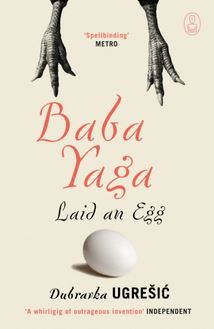-
 Univers
Univers
-
 Ebooks
Ebooks
-
 Livres audio
Livres audio
-
 Presse
Presse
-
 Podcasts
Podcasts
-
 BD
BD
-
 Documents
Documents
-
- Cours
- Révisions
- Ressources pédagogiques
- Sciences de l’éducation
- Manuels scolaires
- Langues
- Travaux de classe
- Annales de BEP
- Etudes supérieures
- Maternelle et primaire
- Fiches de lecture
- Orientation scolaire
- Méthodologie
- Corrigés de devoir
- Annales d’examens et concours
- Annales du bac
- Annales du brevet
- Rapports de stage
La lecture à portée de main
Vous pourrez modifier la taille du texte de cet ouvrage
Découvre YouScribe en t'inscrivant gratuitement
Je m'inscrisDécouvre YouScribe en t'inscrivant gratuitement
Je m'inscrisEn savoir plus
Vous pourrez modifier la taille du texte de cet ouvrage
En savoir plus

Description
Informations
| Publié par | Canongate Books |
| Date de parution | 16 août 2007 |
| Nombre de lectures | 0 |
| EAN13 | 9781847678539 |
| Langue | English |
Informations légales : prix de location à la page 0,0400€. Cette information est donnée uniquement à titre indicatif conformément à la législation en vigueur.
Extrait
CONTENTS
Translator’s Note
About Agamemnon’s Daughter
Agamemnon’s Daughter
The Blinding Order
The Great Wall
TRANSLATOR’S NOTE
This volume contains three stories written at different times, set in different historical periods, but linked to one another and to many other works of Ismail Kadare by recurrent characters, anecdotes, obsessions, and principles.
Agamemnon’s Daughter was written in Tirana around the time of the death of Enver Hoxha, who ruled Albania for forty years. The action is placed in the real Tirana of the early 1980s, but its narrative takes us back to the classical roots of Western civilization and of tyranny. Its sequel, The Successor , written many years later, brings the same characters back to life.
"The Blinding Order" was written in 1984 and is set in the Tanzimat, or "reform" period of the Ottoman Empire, in the nineteenth century. It speculates on the uses of terror in a context that is only superficially remote from modern authoritarian regimes.
Mark-Alem, the central character of Kadare’s Palace of Dreams , makes a fleeting appearance; the main protagonists belong to a branch of the Köprülü clan, whose long history is chronicled throughout Kadare’s work.
"The Great Wall" was written in 1993, shortly after Kadare settled in Paris. The bridge built by the Ura family, whose story is told in The Three-Arched Bridge , here gives a key to the meaning of the Great Wall of China. We also encounter the horrifying Timur the Lame (Tamerlane), who gives such a stunning conclusion to The Pyramid , Kadare’s fable of ancient Egypt.
The first of these stories was translated from the French of Tedi Papavrami; the two others, from the French of Jusuf Vrioni. Some amendments have been made to the texts in consultation with the author, particularly with regards to Albanian names and spellings.
D.B.
P RINCETON, N. J., 2006
ABOUT AGAMEMNON’S DAUGHTER
Adapted from the publisher’s preface to the French edition
In 1986, during one of his infrequent visits to Paris, Ismail Kadare told me that he wanted to leave the manuscripts of two short novels, a story, and some poems in France, as they could not be published in Albania at that time.
He had part of the material with him. "Exfiltration" of literary manuscripts was strictly forbidden under Albanian law, so Kadare camouflaged his text to make it look like an Albanian translation of a work written in the West. He had substituted German and Austrian names and places for Albanian ones, and attributed the works to the West German novelist Siegfried Lenz. Lenz was not unknown in Albania, but not to the extent that people could be sure whether he had written a novel called The Three Ks , as Kadare then entitled the novel subsequently known as L’Ombre (The Shadow).
Later on, Kadare managed to smuggle more of his manuscripts out of Albania, but because exfiltration remained extremely perilous, he limited his risks by bringing only a few pages on each trip. To get the remainder of the material out of the country, we agreed that the best way was for me to go to Tirana myself. Over two separate trips, I managed to bring all the remaining sheets back to Paris so as to have complete texts of The Shadow, Agamemnon’s Daughter, L’Envol du Migrateur (A Bird Flying South), and the poems.
The manuscripts were deposited in a safe at the Banque de la Cité in Paris. With the bank’s approval, Kadare entrusted me with the key to the safe and gave me authority to open it if and when I thought it necessary.
At that time Ismail Kadare had no greater inkling than anyone else that Albanian Communism would collapse. The deposit of these "dangerous" manuscripts was intended to allow Kadare’s publisher, in the event of the writer’s natural or "accidental" death, to declare that a previously unknown portion of his work would be published quickly. The revelation of the tone and content of the unpublished works would make it much harder for the Communist propaganda machine to bend Kadare’s work and posthumous image to its own ends.
The three prose texts and the poems put into the bank’s safe express directly and unambiguously what Kadare thought of the Albanian regime. Previously, he had touched on the matter only indirectly and by allusion, in works like The Palace of Dreams, La Niche de la honte (The Nook of Shame), and The Concert.
The first of these hidden works to appear in France was The Shadow, in 1994. It was rewritten to erase its German camouflage, especially noticeable in the earlier part of the novel. Editorial improvements were made to fill gaps that had been left quite intentionally when the work’s primary aim had been to get a message across in the literal sense, across the border separating Albania from the rest of the world.
A Bird Flying South was published later. In Albania, it was published simultaneously in two versions the original text as smuggled out of Albania and a corrected and edited version, the form in which Kadare wished it to return to Albania.
Agamemnon’s Daughter , the third of the manuscripts put into safekeeping, was published in France in 2003 in a translation by Tedi Papavrami from the text written in 1984–1986 without any later changes or revisions. Agamemnon’s Daughter is the first part of a diptych of which the longer tale, The Successor , was written in Paris in 2002. Taken together these two short novels constitute one of the finest and most accomplished of all Ismail Kadare’s works to date.
C LAUDE D URAND
P ARIS
Agamemnon’s Daughter
1
From outside came sounds of holiday music, bustling crowds and shuffling feet the special medley of a mass of people on their way to the start of a parade.
For perhaps the tenth time in a row, I cautiously pulled the curtain aside. There had been no change in what was to be seen in the street: a slow-moving eddy in the human flood streaming towards the centre of town. Borne on its waves were placards, bouquets of flowers, and portraits of members of the Politburo, just like the ones we saw last year. The politicians’ faces looked even more stilted than usual as they jiggled along above the thronging mass of heads and arms. A slip of a placard-bearer’s hand sometimes made the painted portraits seem to cast oblique and threatening glances. But even when they came face-to-face, not one of them gave a sign of recognising any other.
I let go of the curtain and realised that I still had the invitation gripped tightly in my hand. It was the first time I had been entitled to sit in the grandstand at the May Day parade, and I still could not quite believe that it really was my own name written on the card. When I first received it, the Party secretary seemed as stunned as I was. It wouldn’t be fair to say that the only emotion in his eyes was that of envy: there was also stupefaction. To some extent, that was perfectly justifiable. I wasn’t the kind of person who was usually seen at presidium meetings or invited to sit in the stands at public celebrations. Even if (as I later learned) the vice-secretary himself had put my name forward when requested by the local Party committee to suggest people beyond those who came up every year, he was still astonished by the result. Although he had proposed my name, he probably never expected his new list would be approved. "They always ask us for new names," he must have thought, "but it’s always the same ones who get invited in the end."
"Congratulations, congratulations," he hissed as he gave me the card, but at the very moment he handed it over, his eyes seemed to me to express something beyond envy and surprise. It hovered within the smile that gave it life, yet it was something separate and different. The right word for it might have been connivance . In short, it was an intense, interrogative, and rather sly smile, but sly in that particular well-meaning manner that arises between people who share some secret involvement. His smile seemed to be saying: "This invitation didn’t fall off a tree, did it, pal? What job did you do to earn the reward? But who cares anyway! Congratulations, my boy!"
It was so crass I felt myself blush. All the way home, I could not throw off a guilty feeling, as I wondered over and over again: he must be right, but what did I do to earn this invitation?
Isolated from the hubbub on the street, the apartment seemed even more silent than usual. Silent and empty. Everyone had left for the starting point of the parade, and my own steps, far from filling the space of the apartment, only emphasised how silent and empty it was. Even the silence and the emptiness had a peculiar quality, as did everything else on a day of that kind.
I was waiting for Suzana. However, the feeling that had burrowed into my chest was not remotely like the anxiety customarily associated with waiting for a woman. It was much more crushing, and no doubt heightened by the music and the unending, exhausting commotion rising from the street. I almost thought that one of the portraits would end up detaching itself from its bearer, then float up to my window, and look inside with its painted frozen stare, and say: "And what are you doing up here? Aha! So that’s the reason! You’ve relinquished your place down there on the reviewing stand to wait for a woman, haven’t you?"
"If I’m not there by half past eight, don’t wait for me," Suzana had said.
Each time those words came into my mind my eyes glided inexorably towards the couch where our last conversation had taken place. It had been infinitely sad. She’d been half-undressed, and her words had come out the same way in shreds, with only half their meaning. It was getting harder and harder for her to see me, she said. Papa’s career was on the rise… Their family was more than ever in the lime-light… Two weeks before, at the last plenum of the Central Committee, Papa had gone up another rung… So it was obvious she would have to make changes to her way of life, to her wardrobe, to the people sh
-
 Univers
Univers
-
 Ebooks
Ebooks
-
 Livres audio
Livres audio
-
 Presse
Presse
-
 Podcasts
Podcasts
-
 BD
BD
-
 Documents
Documents
-
Jeunesse
-
Littérature
-
Ressources professionnelles
-
Santé et bien-être
-
Savoirs
-
Education
-
Loisirs et hobbies
-
Art, musique et cinéma
-
Actualité et débat de société
-
Jeunesse
-
Littérature
-
Ressources professionnelles
-
Santé et bien-être
-
Savoirs
-
Education
-
Loisirs et hobbies
-
Art, musique et cinéma
-
Actualité et débat de société
-
Actualités
-
Lifestyle
-
Presse jeunesse
-
Presse professionnelle
-
Pratique
-
Presse sportive
-
Presse internationale
-
Culture & Médias
-
Action et Aventures
-
Science-fiction et Fantasy
-
Société
-
Jeunesse
-
Littérature
-
Ressources professionnelles
-
Santé et bien-être
-
Savoirs
-
Education
-
Loisirs et hobbies
-
Art, musique et cinéma
-
Actualité et débat de société
- Cours
- Révisions
- Ressources pédagogiques
- Sciences de l’éducation
- Manuels scolaires
- Langues
- Travaux de classe
- Annales de BEP
- Etudes supérieures
- Maternelle et primaire
- Fiches de lecture
- Orientation scolaire
- Méthodologie
- Corrigés de devoir
- Annales d’examens et concours
- Annales du bac
- Annales du brevet
- Rapports de stage















